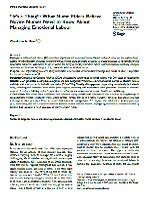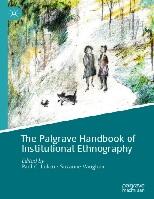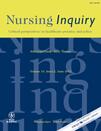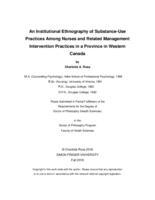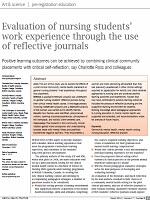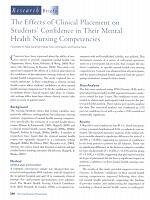Ross, Charlotte A.
Person Preferred Name
Charlotte Ross
Position
Emeritus Faculty
Department
Status
retired
Affiliation Date
2005 to 2023
Education and Credentials
PhD (Simon Fraser University)
M.A (Adler School of Professional Psychology)
B.Sc. (University of Victoria)
Douglas College Faculty Emeritus.
PhD (Simon Fraser University)
M.A (Adler School of Professional Psychology)
B.Sc. (University of Victoria)
Douglas College Faculty Emeritus.
Related Works
Content type
Digital Document
Abstract
Background
Emotional labour (EL) can take a significant toll on nurses’ mental health and well-being and has serious implications for the retention of nurses in the workforce. Nurse educators have struggled to prepare novices to manage EL or find serviceable resources with which to do so within the body of nursing literature, which is dominated by essentially unhelpful narratives and is absent of the practical, real-world wisdom of elder nurses.
Purpose
This exploratory research study illuminated elder nurses’ experiential knowledge and beliefs of what is important for novices to learn about EL.
Methods
Conventional Content Analysis (CCA) of qualitative survey data from 688 nurses with 20+ years of experience.
Results
CCA generated descriptive categories and sub-categories: What the elders themselves learned as student nurses, and their advice to novices in the individual realm, (“It's a Thing,” healthy disengagement, supporting mental and physical well-being, reframing self-reproach), team realm (peer support, mentors), and institutional realm (structural barriers to mentors’ support of novices, building novices’ capacities for self-advocacy, resources to support health and well-being).
Conclusions
The elders’ data confronted and reframed legacy individuated narratives in the literature by supporting and contextualizing nurses’ emotional work. Elders advised novices that EL is a reality requiring concrete strategies to manage it throughout their practices. Elders extended their focus for management of EL beyond the individual to include peer support, mentorship, and the structural conditions in which nurses perform their EL, highlighting the need to empower nurses by building their capacity for self-advocacy of their workers’ rights.
Origin Information
Content type
Digital Document
Description / Synopsis
The chapter "Public protection as a ruling concept in management of nurses' substance use" was written by Dr. Charlotte A Ross (Douglas College).
Origin Information
Content type
Digital Document
Abstract
Charlotte Ross will share her lived experience of completing her doctoral degree. Gain insight on things to consider and get advice on how to navigate through doctoral programs. Presented at the Douglas College Research Café on April 25, 2022.
Origin Information
Content type
Digital Document
Abstract
Nurses’ experiences in, and the overall effectiveness of, widely used alternative‐ to‐discipline programs to manage nurses’ substance‐use problems have not been adequately scrutinized. We uncovered the conflicted official and experiential ways of knowing one such alternative‐to‐discipline program in a Canadian province. We explicated this conflict through an institutional ethnography analysis. Ethnographic data from interviews with 12 nurses who were enrolled in an alternative‐to‐discipline treatment program and three program administrators, as well as institutional texts, were analyzed to explore how institutional practices and power relations co‐ordinated and managed nurses’ experiences. Analysis revealed the acritical acceptance of a standardized program not based on current norms of practice. Potential and actual conflicts of interest, power imbalances, and prevailing corporate interests were rife. Nurses were not afforded the same rights to quality ethical health care as other citizens. ‘Expert’ physicians’ knowledge was privileged while nurses’ knowledge was subordinated. Conclusions were that regulatory bodies cannot rely on the taken‐for‐granted standardized treatment model in widespread use. Individualized treatment alternatives reflecting current, scientific evidence must be offered to nurses, and nurses’ knowledge, expertise, and experiences need to be included in decision‐making processes in these programs.
Origin Information
Content type
Digital Document
Abstract
With the introduction of cultural safety into nursing curricula, educators are grappling with ways to take their own understanding of the concept to create culturally safe places in their educational environments. The purpose of this paper is to share a process of writing as inquiry to surface new meanings in what might ontologically be understood as culturally safe environments. The writing illuminates individual and collective meanings of cultural safety from the perspectives of eight Canadian nurse educators. Using aesthetic texts and hermeneutic approaches, the meaning of cultural safety is exposed. Fluid depictions of the self as other, along with politicized taken for granted practices and multiple fields of meaning, bring clarity to a view that knowledge is always partial. Since knowledge is co-constructed, situated and socially produced, the representations of our evolving stories and cycles of reflection hold to an element of partiality in epistemological privilege The various texts shared offer insight into thinking about culturally safe spaces as horizons of new meaning. The implications for nursing education are in recognizing locations for both the educators and the learners. These writing and interpretive processes can be integrated into curricula to strengthen reflexive and relational practice.
Origin Information
Content type
Digital Document
Abstract
Problematic substance use (PSU) among nurses has wide‐ranging adverse implications. A critical integrative literature review was conducted with an emphasis on building knowledge regarding the influence of structural factors within nurses' professional environments on nurses with PSU. Five thematic categories emerged: (i) access, (ii) stress, and (iii) attitudes as contributory factors, (iv) treatment policies for nurses with PSU, and (v) the culture of the nursing profession. Conclusions were that an overemphasis on individual culpability and failing predominates in the literature and that crucial knowledge gaps exist regarding the influence of structural factors on driving and shaping nurses' substance use. [ABSTRACT FROM AUTHOR]
Origin Information
Content type
Digital Document
Abstract
When nurses have problems with substance use and are reluctant to seek treatment, their health and wellness are put at risk and their care provision to the public is potentially compromised. Nurses’ substance-use problems and their management through professional organizations’ treatment programs are under-researched and poorly understood overall, and particularly from a Canadian perspective. The disjuncture I experienced between my own embodied experiential knowledge as a nurse and the conceptually based, decontextualized, individuated “official accounts” of the issue I found in the professional and scholarly literature became the problematic that I explored in a multi-phase, manuscript-based doctoral study. I carried out a critical integrative review of the literature on nurses’ substance-use problems, followed by an institutional ethnographic inquiry, in which I aimed to discover (a) how dominant discourses in nurses’ talk about their everyday worlds organized their substance-use practices and (b) how nurses’ experiences were managed in a regulatory treatment program. I utilized data from interviews with 12 standpoint informants (nurses in a regulatory program for substance-use problems) and six secondary informants from different standpoints in the institution, as well as analyses of relevant institutional texts.
This work yielded significant original findings. Dominant individuated, moralistic, decontextualized discourses in nurses’ talk about their everyday worlds and in professional and scholarly texts silenced nurses’ experiences of work stress. Employers’ roles in nurses’ working conditions were obscured. Nurses’ substance-use practices, particularly alcohol, were organized in ways that enabled them to silently manage their distress and keep working. Nurses gaining capacities to self-advocate for improved working conditions was linked to their recovery from substance-use problems. The standardized regulatory treatment program studied was not based on current norms of practice; did not afford nurses the right to choose treatments; privileged physicians while silencing and subordinating nurses; and was rife with conflicts of interest, power imbalances, and private corporate benefits—all acritically accepted by the regulatory body.
The important new nursing knowledge gained informs prevention, treatment, regulatory, and education processes aimed to address nurses’ substance-use problems. It does so from nurses’ everyday knowledge and standpoint, furthering their interests and those of other disciplines concerned with professional power and domination.
Origin Information
Content type
Digital Document
Abstract
We undertook an institutional ethnography utilizing the expert knowledge of nurses who have experienced substance-use problems to discover: (a) What are the discourses embedded in the talk among nurses in their everyday work worlds that socially organize their substance-use practices and (b) how do those discourses manage these activities? Data collection included interviews, researcher reflexivity, and texts that were critically analyzed with a focus on institutional features. Analysis revealed dominant moralistic and individuated discourses in nurses’ workplace talk that socially organized their substance-use practices, subordinated and silenced experiences of work stress, and erased employers’ roles in managing working conditions. Conclusions included that nurses used substances in ways that enabled them to remain silent and keep working. Nurses’ education did not prepare them regarding nurses’ substance-use problems or managing emotional labor. Nurses viewed alcohol as an acceptable and encouraged coping strategy for nurses to manage emotional distress.
Origin Information
Content type
Digital Document
Abstract
Aims The aim of this study was to explore the effects of a pilot clinical community mental health placement on general nursing students' lived experiences throughout that placement. Method A qualitative thematic analysis was undertaken on general nursing students' reflective journals during their clinical mental health course. A two-stage process involving independent analysis and a dependent analysis of the journals was carried out to identify themes. Results Four themes were identified: preconceived notions; learning outcomes/experiences; atmosphere of the workplace; and holistic client-centered care. Conclusions The students in this community clinical rotation gained more compassion and understanding towards those with mental illness and positively transformed negative opinions. They encountered a warmer and more welcoming atmosphere than they had previously experienced in other clinical settings, acquired an appreciation for holistic and client-centered approaches to nursing care and achieved positive learning outcomes and experiences. Factors that may have contributed to positive learning outcomes included the process of reflective journaling and the supportive learning environment for students. Existing knowledge about pedagogical approaches to nursing education in clinical mental health was supported and extended, and recommendations made for avenues of future inquiry.
Origin Information
Content type
Digital Document
Abstract
This study evaluated and compared the effects of clinical placement on the confidence of baccalaureate nursing students in their mental health competencies. The study explored two research questions: 1) Does completing a clinical mental health course affect students' confidence in their mental health nrusing competencies? 2) Do the confidence levels of students whose clinical courses take place in community settings differ from those whose clinical courses take place in acute in-patient units?
Origin Information


